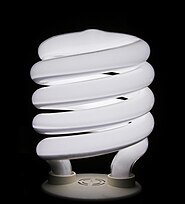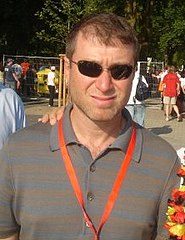| Main page | New articles & Tasks |
 The Energy Portal Welcome to Wikipedia's Energy portal, your gateway to energy. This portal is aimed at giving you access to all energy related topics in all of its forms.
|
Page contents: Selected article • Selected image • Selected biography • Did you know? • General images • Quotations • Related portals • Wikiprojects • Major topics • Categories • Help • Associated Wikimedia |
Introduction
In physics, energy (from Ancient Greek ἐνέργεια (enérgeia) 'activity') is the quantitative property that is transferred to a body or to a physical system, recognizable in the performance of work and in the form of heat and light. Energy is a conserved quantity—the law of conservation of energy states that energy can be converted in form, but not created or destroyed. The unit of measurement for energy in the International System of Units (SI) is the joule (J).
Common forms of energy include the kinetic energy of a moving object, the potential energy stored by an object (for instance due to its position in a field), the elastic energy stored in a solid object, chemical energy associated with chemical reactions, the radiant energy carried by electromagnetic radiation, and the internal energy contained within a thermodynamic system. All living organisms constantly take in and release energy.
Due to mass–energy equivalence, any object that has mass when stationary (called rest mass) also has an equivalent amount of energy whose form is called rest energy, and any additional energy (of any form) acquired by the object above that rest energy will increase the object's total mass just as it increases its total energy.
Human civilization requires energy to function, which it gets from energy resources such as fossil fuels, nuclear fuel, or renewable energy. The Earth's climate and ecosystems processes are driven by the energy the planet receives from the Sun (although a small amount is also contributed by geothermal energy). (Full article...)
Selected article
There are many motivations to improve energy efficiency. Reducing energy use reduces energy costs and may result in a financial cost saving to consumers if the energy savings offset any additional costs of implementing an energy efficient technology. Reducing energy use is also seen as a solution to the problem of reducing carbon dioxide emissions. According to the International Energy Agency, improved energy efficiency in buildings, industrial processes and transportation could reduce the world's energy needs in 2050 by one third, and help control global emissions of greenhouse gases.
Energy efficiency and renewable energy are said to be the twin pillars of sustainable energy policy and are high priorities in the sustainable energy hierarchy. In many countries energy efficiency is also seen to have a national security benefit because it can be used to reduce the level of energy imports from foreign countries and may slow down the rate at which domestic energy resources are depleted.
Selected image

Photo credit: Postdlf
Lightning is a highly visible form of energy transfer.
Did you know?
- During World War I, the German Army produced shale oil from Yarmouk oil shale deposits in Jordan to operate the Hijazi Railway (pictured)?
- Dennis Spurgeon, formerly chief operating officer at uranium supplier USEC Inc., became the United States Assistant Secretary for Nuclear Energy in 2006?
- Japan Canada Oil Sands Limited was the first offshore oil company to exploit the Athabasca oil sands in Canada?
- Teesside Power Station is the largest combined-cycle gas turbine (CCGT) plant in Europe.?
- The Klaipėda Geothermal Demonstration Plant in Lithuania was the first geothermal plant in the Baltic Sea region?
- Hitachi Zosen Corporation built the first oil tanker in Japan in 1908 per an order by Standard Oil Company?
- Coalbed methane is a form of natural gas extracted from coal beds?
- When constructed in 1906, the Baku–Batumi pipeline was the world's longest kerosene pipeline?
Selected biography
Between 1992 and 1995, after Soviet president Mikhail Gorbachev's 'perestroika' economic reforms permitted the opening of small private businesses, Abramovich founded five companies that eventually evolved to specialize in the trading of oil and oil products. With the approved by Boris Yeltsin, in 1995 Roman Abramovich and partner Boris Berezovsky paid $100m for a controlling interest in the major Russian Sibneft oil company, then valued at $150 million. Berezovsky subsequently sold his stake to Abramovich after fleeing to London. In September 2005 Abramovich sold his interest in Sibneft to state energy giant Gazprom for $13 billion.
Despite maintaining that his primary residence is Moscow, in 2006 Abramovich was named as the second-wealthiest person in the United Kingdom. His property investments and other assets were estimated at £10.8 billion. In June 2003, Abramovich became the owner of the companies that control Chelsea Football Club (soccer club). He also became the world's greatest spender on luxury yachts, with four boats in what the media have called the 'Abramovich Navy'.
Although he rarely visits the area, in October 2005 Abramovich was reappointed governor of the impoverished Chukotka Autonomous Okrug in the Russian Far East where he has made significant financial contributions. He was originally elected to the governorship in 1999.
In the news
- 7 April 2024 – Russian invasion of Ukraine
- The IAEA reports that the Zaporizhzhia Nuclear Power Plant's Unit 6 was targeted by a drone strike, although nuclear safety has not been compromised, according to the statement. (IAEA)
General images
Quotations
- "Without radical international measures to reduce carbon emissions within the next 10 to 15 years, there is compelling evidence to suggest we might lose the chance to control temperature rises. Failure to act will make an increase of between 2 and 5 degrees [3.6 - 9°F] in average temperatures almost inevitable." – Tony Blair, 2006
- "The question is not whether climate change is happening or not, but whether, in the face of this emergency, we ourselves can change fast enough." – Kofi Annan, 2006
- "I promise you a day will come when our children and grandchildren will look back and they will ask one of two questions. Either they will ask, 'What in God's name were they doing? Didn't they see the evidence?' Or, they may look back and say 'How did they find the uncommon moral courage to rise above politics and redeem the promise of American democracy?'" – Al Gore, 2007, on global warming.
Related portals
WikiProjects
WikiProjects connected with energy:
Other WikiProjects that may be of interest:
Major topics
Major categories
National energy supply, use & conservation
National electricity sector
Politics, economics, environment
- Climate change
- Energy conservation
- Energy economics
- Energy crises
- Energy development
- Energy policy
- Peak oil
Energy sources
- Fuels
- Biofuels
- Fossil fuels
- Fusion power
- Nuclear technology
- Renewable energy
- Energy conversion
- Electric power
- Energy storage
Energy-related design
Scientific usage
Help

Puzzled by energy?
Can't answer your question?
Don't understand the answer?
- Ask at the reference desk
- Read the Wikipedia help pages
For further ideas, to leave a comment, or to learn how you can help improve and update this portal, see the talk page.
Associated Wikimedia
The following Wikimedia Foundation sister projects provide more on this subject:
-
Commons
Free media repository -
Wikibooks
Free textbooks and manuals -
Wikidata
Free knowledge base -
Wikinews
Free-content news -
Wikiquote
Collection of quotations -
Wikisource
Free-content library -
Wikiversity
Free learning tools -
Wiktionary
Dictionary and thesaurus




























































































































































































